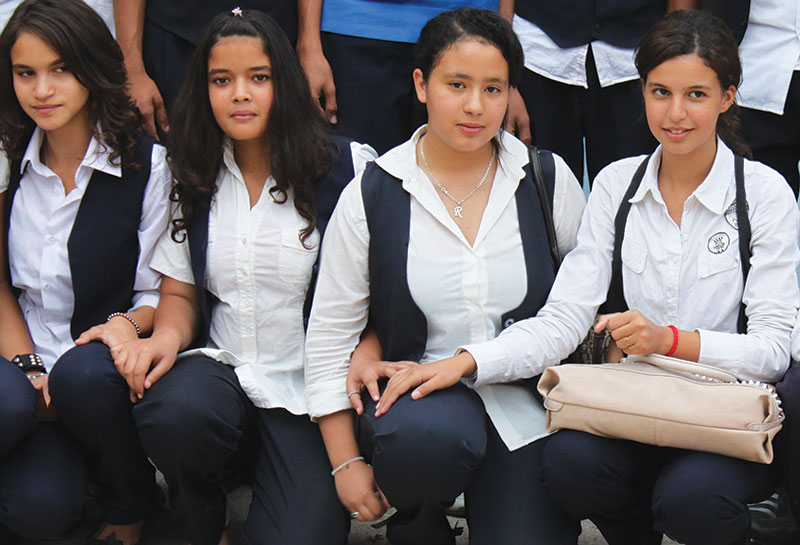[vc_row][vc_column width=”1/1″][vc_column_text]
MOROCCO:
USAID Life Skills Training Deters Child Marriage
[/vc_column_text][/vc_column][/vc_row][vc_row][vc_column width=”2/3″][vc_column_text]
USAID life skills/employability clubs provide youth with lifelong knowledge and friendships.
“I’m especially pleased by Morocco’s commitments to take on the deeply troubling problem of child marriage. We know that child brides are less likely to get an education, more likely to face life-threatening problems, particularly around child birth and delivery, which not only shortchanges them but can even rob them and their communities of their lives and talents. “
With these words at the Opening Plenary of the U.S.-Morocco Strategic Dialogue, former Secretary of State Hillary Clinton acknowledged to Foreign Minister Saad-Eddine Al-Othmani his country’s efforts to address and end the practice of child marriage. In her opening remarks, Secretary Clinton referenced the long history of partnership that exists between the United States and Morocco, dating back to 1777, and the mutual interest both countries presently have to engage, educate, and give opportunity to youth.
The story of Aziza and Fatima tangibly demonstrates the positive outcome of such mutual efforts by both governments. Aziza and Fatima are 15 years old and live in the villages of Douar Lkhmirate and Douar Ouled El Khadi in the Moroccan countryside, 15 km from Ibn Baja, the middle school they attend. Last year, the girls faced a very similar and striking experience: Their parents forced them to leave school for primarily financial reasons. The parents did not believe they could find the means to pay for lodging the following year, as the girls were assigned to a high school in El Jadida, a distance too far to travel daily.
Moroccan law very clearly prohibits marriage for those under the legal age of 18. However, in rural areas, enforcement proves at times more challenging. Because they did not plan for their daughter to continue to high school, Aziza’s parents arranged for her to marry a worker who lived with the family. In Fatima’s case, her mother believed she should work in the field to help the family and help raise her little sister, since “in any case, she does not have long before she marries and has her own children.”

In school though, Aziza and Fatima had participated in a USAID life skills/employability club. When Aziza and Fatima’s peers noticed their long absence, they quickly understood that they needed help: “We learned to think of others and try to help others. These are human values that we learned thanks to the club and that brought us together.”
One day, their peers from the club organized their thoughts, chose a spokesperson for the group, and went to see the program director to raise awareness of Aziza and Fatima’s circumstances. Together, they visited the two families and convinced the parents to let their daughters finish the school year and continue their education.
When the girls returned after a two month absence, their peers shared their class notes and helped them to make up any missing work, so they could prepare for final exams. Aziza and Fatima both excelled and were able to find lodging close to the high school at El Jadida. Thanks to this program, Aziza and Fatima can continue their studies, choose when to marry, and ultimately build their futures.
—Mounya El Asri and Ingrid Graves, Communications[/vc_column_text][/vc_column][vc_column width=”1/12″][/vc_column][vc_column width=”1/4″][vc_widget_sidebar sidebar_id=”sidebar-primary”][/vc_column][/vc_row]